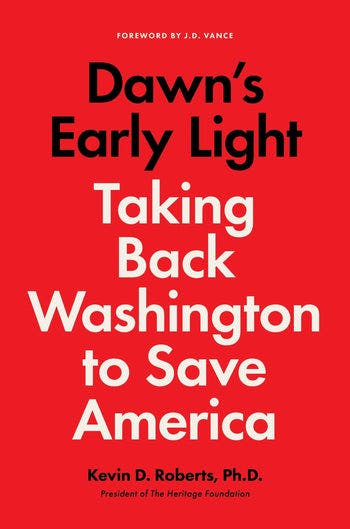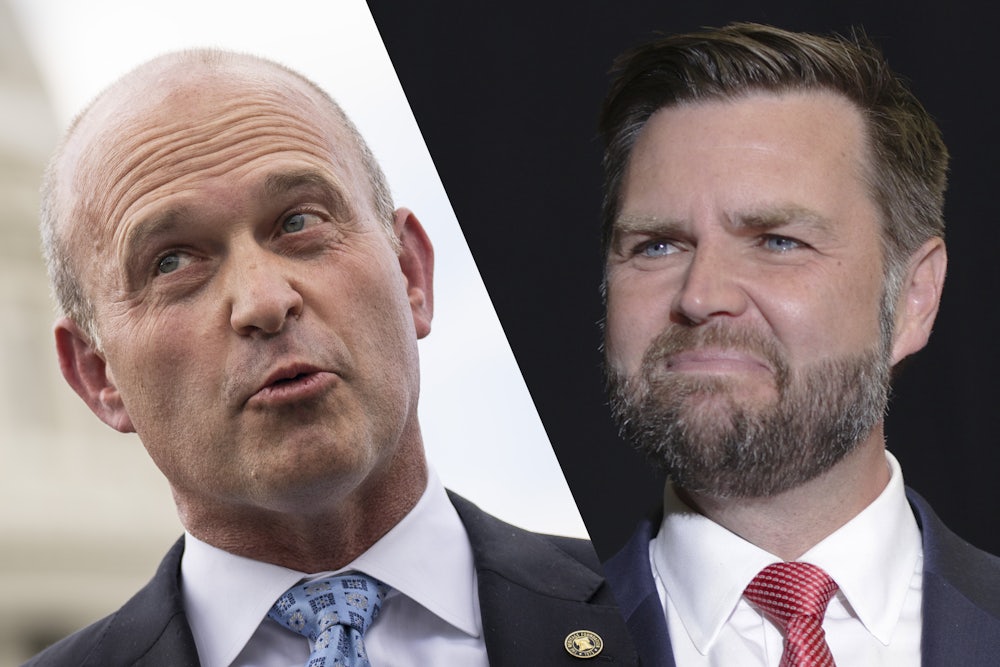Kevin Roberts styles himself as a modern Prometheus, and thinks he’s here to bring the fire. The president of the Heritage Foundation’s forthcoming book, Dawn’s Early Light: Taking Back Washington to Save America, opens with metaphors about fires, claiming that in 2020 “our country went up in flames” and now it’s time to “fight fire with fire.” Using the massive California forest fires of 2020 as a stark, vivid metaphor, Roberts argues that America’s institutions have become “deadwood in a forest,” and that conservatives “can’t merely continue putting out fires”; they must be “brave enough to go on the offense, strike the match, and start a long, controlled burn.”
Alas, as firefighters will tell you, sometimes a controlled burn gets out of hand. Roberts, in addition to being the Heritage Foundation’s president, was also one of the architects of “Project 2025,” its blueprint for the radical disruption of the American way of life so extreme that even Donald Trump was forced to distance himself from it. In the wake of a great deal of harsh public scrutiny, Roberts is now seeing what happens when a fire gets away from you. Originally scheduled for publication in September, Dawn’s Early Light has been pushed back to a week after the election, as the Trump campaign tries vainly to stomp out the furor around Project 2025. Trump went so far as to deny ever having met Roberts (before photos of them smiling on a private plane emerged).

Dawn’s Early Light has all the misplaced confidence of a movement that’s mistaken a 6–3 Supreme Court and an easily played New York Times op-ed page for some kind of mandate. The party that has won the popular vote in a presidential election exactly once in the last 35 years is not popular, and people do not want what they’re selling. When your only path to power consists in gerrymandering and shaving tight victories in a few key swing states while the opposition runs up the margins nearly everywhere else, you might try for some soul-searching about why people don’t like you, but Roberts and his Heritage Foundation have instead opted for violent threats, claiming a “second American revolution” is coming that will remain “bloodless” only “if the left allows it to be.”
Even though it now seems likely Roberts’s book itself is being pushed to the side, he and his allies are still annoyingly dangerous. Not least because people who are within striking distance of power have endorsed their message: Trump’s running mate, J.D. Vance, wrote the book’s foreword. That message, Dawn’s Early Light nakedly reveals, is how the right plans to use paranoid, Stalinist tactics to remake the country in its preferred image.
Dawn’s Early Light tells in many ways a familiar conservative story—the brain trust at the Heritage Foundation, as it happens, doesn’t have an especially new or compelling narrative to offer. America is in decline, apparently, due to “pantsuited girlboss advertising executives, Skittle-haired they/them activists, soy-faced pajama-clad work-from-home HR apparatchiks, Adderall-addicted dog mom diversity consultants, nasally voiced Ivy League regulatory lawyers, obese George Soros-funded police abolitionist district attorneys, [and] hipster trust fund socialists.” These are some of the “least impressive people in the history of the world,” though it’s actually not their fault; they are all secretly controlled by what Roberts calls the “Uniparty,” which he never quite explicitly defines but is a loose, fungible cabal of neoliberals, corporate bureaucrats, hedge-fund managers, public school unions, antifa activists, and George Soros. (Roberts loves a scary epithet; in addition to the Uniparty, the villains of his story also get termed “The Conditioners” and “the Party of Destruction.”) This Uniparty has been poisoning the minds of good, upstanding, ordinary Americans, conditioning them to dye their hair, get dogs, develop nasal voices, and work in advertising. They must be stopped, for some reason.
Most of the book’s 11 chapters each single out a usual suspect: public schools, China, godlessness, regulation, and so on. But the overall goal here is a much more widespread destruction of any number of cultural and governmental institutions, only a few of which are enumerated in the opening pages: “Every Ivy League college, the FBI, the New York Times, the National Institute of Allergy and Infectious Diseases, the Department of Education, 80 percent of ‘Catholic’ higher education, BlackRock, the Loudoun County Public School System, the Boy Scouts of America, the Bill & Melinda Gates Foundation, the World Economic Forum, the Chinese Communist Party, and the National Endowment for Democracy.”
What is the plan to enact this bloodletting? While there are sops to Ronald Reagan throughout, Dawn’s Early Light is clear that the era of small government is over; Roberts thinks government should be the change he wants to see in the world. The New Conservative Movement, as he terms it, will use the federal government as a bludgeon against any and all of its cultural and economic foes, while the small-minded small government folk are derided throughout as “wax-museum conservatives.”
So what can Big Government do for you? Chiefly, Roberts wants it to enforce a new America of Faith, Family, Community, and Work—what he calls “The Permanent Things” (a phrase he credits to Russell Kirk, which Kirk in fact got from T.S. Eliot), which he defines but struggles to make a case for. These abstractions, as defined by Roberts, constitute “the enduring record of human flourishing stretching back into the mists of history,” and they are what is currently under assault by the Uniparty and its many Skittle-haired minions. His definition of each is static and not subject to debate; of “Family,” he writes that the “nuclear family is the foundation of the human order”; of “Faith,” he explains that mankind “is made to worship, and our republic depends on the moral strength and habits of heart brought about by piety.” But having delineated these values, he offers no argument for them. They are taken as entirely axiomatic, and he proceeds on the assumption that they are unassailable.
Which is odd, given that the definitions themselves are confusing and at times contradictory. The “Faith” definition continues:
A man’s religious tradition is a matter of his conscience, but that we have a faithful people is a matter of public concern. Accordingly, the state must not discriminate against religious organizations in government programs, and freedom of religion should take precedence over the enforcement of other rights. Policies that encourage religious observance, such as Sabbath laws and voucher programs that include religious schools, should be encouraged. American society is rooted in the Christian faith—certainly public institutions should not establish anything offensive to Christian morals under the guise of “religious freedom” or “diversity, equity, and inclusion.”
So any faith is fine, but here in America Christians get precedent. All should observe the Sabbath, but the Sabbath, he clarifies elsewhere, is Sunday (Jews and Muslims will just have to deal).
This is a dangerous line for a Catholic like Roberts to be treading—as he seems unaware, for much of America’s history, Catholics were not only unwelcome in this country, they were considered by xenophobes to be unable to participate in American democracy. Their supposed allegiance to their priests and the foreign pope made it impossible, these bigots claimed, for them to rationally engage in participatory democracy (“Are not their doctrines opposed to republican institutions?” Texas hero Sam Houston asked in 1855, arguing, as was common at the time, that all Catholics be required to wait 21 years after gaining citizenship before they could vote). Given that anti-Catholic rhetoric was a bedrock of this country, one that led to a series of deadly riots throughout the nineteenth century led by the Know Nothings and the American Protection Society, among others, Catholics would seem to be the last group of Americans who should be dictating that any one religion gets priority here.
But someone whose goal is the destruction of “every Ivy League college” and who repeatedly cites the “great Renaissance scholar and classicist” James Hankins (who is faculty at Harvard) cannot be expected to be a particularly thorough or rigorous thinker. Roberts is less interested in history than he is in nostalgia, thinking if he hammers his “Permanent Things” hard enough he can skip over making a case for them. His is a world in which men and women marry early; women stay home and have more kids. “Men and women,” he explains, “should marry (and do so younger than most do today). They should marry for life and should bring children into the world (more than most do today).”
Why are fewer people getting married, why are many getting divorced, and why are people having fewer children? Roberts’s answer might surprise you. It’s in fact the result of a variety of nefarious technologies, pushed by eugenicists, that keep us from our true purpose. “The birth control pill,” he tells us, “was the product of a decades-long research agenda paid for by the Rockefeller Foundation and other eugenicist and population control-oriented groups.” These eugenicist-sponsored technologies, Roberts believes, are the true culprits, for they “shift norms, incentives, and choices, often invisibly and involuntarily,” making us think we want something that we in fact don’t.
Once we were given access to the pill, in other words, being childless became seen as “natural” and giving birth as “unnatural.” Where exactly he’s getting this is not made clear. But he seems set on this idea that declining birth rates are the product of a “a society remade according to a research agenda set by the Party of Destruction,” pointing the finger at the Rockefeller Foundation, the Ford Foundation, and the Bill & Melinda Gates Foundation. Even a thing you might think the pro-birth crowd might like, like in vitro fertilization—which produces babies!—is not good in Roberts’s view. Maybe it “seems to assist fertility,” but it “has the added effect of incentivizing women to delay trying to start a family, often leading to added problems when the time comes.”
Why stop there? So many new technologies are apparently conspiring to keep us from having more kids: “video games, huge high-definition TVs, social media, pornography, and more. These technologies aren’t thought of as contraceptive, but that’s what their effect is in American life: they make young men lazier and more impotent (literally) and less inclined to be husbands and fathers.” This technological conspiracy, where every modern convenience from the Pill to the Playstation is keeping us from our God-given duty to be fruitful and multiply, must be fought at every level—from government tax policy and regulation (to encourage stay-at-home mothers) to pro-family technologies (like Tinder rival “Keeper,” a dating app whose mission is to “end human loneliness by giving everyone the opportunity to start a happy, healthy family”).
But Roberts admits these solutions won’t be enough to fight the anti-natalist cabal; the biggest headwind against fertility, he notes, “is not this or that government policy but prosperity itself: the wealthier a society is, the greater the opportunity cost involved in raising kids.” Having children is thus “not an economical calculation but an act of faith and love.” Which is to say, not only should you be having more kids, but you should be prepared to go into poverty to do so:
Rejecting decadence means making a conscious choice not to maximize our own comfort, efficiency, and independence.… As the economist (and mother of eight) Catherin Pakaluk showed in her beautiful study Hannah’s Children: The Women Quietly Defying the Birth Death, choosing to have a large family is ultimately about valuing children in and of themselves above “a more comfortable lifestyle,” usually done as an act of faith.
According to publicly available records, Roberts makes a salary of over $675,000 as president of the Heritage Foundation. For him, a large family doesn’t mean necessarily sacrificing comfort or independence, but for those of us who don’t rake in large checks from lavishly funded think tanks, it’s important we prioritize Roberts’s preferred family size over our own lifestyles.
Why are conservatives so obsessed with what other people do in the bedroom and how many new people come out of it? Simply put, because Roberts’s America hungers for more bodies, and more labor. Throughout Dawn’s Early Light is a constant worry about China, about outsourcing jobs, and about bringing manufacturing back to the United States. “We need to pursue an Active Commerce for the twenty-first century,” he tells us. “That means taking back control of our global supply chains and using all the powers of the United States—our governments, industries, and communities working in concert—to restore our economic sovereignty.” It makes sense that he thinks people should be pushing out as many kids as possible, living on poverty wages if need be, if we’re going to bring back low-skilled manufacturing to the heartland. An Adderall-popping dog mom can only produce so many iPhones in an hour by herself.
Roberts wants to “recover the republican tradition of confronting globalist corporatism exemplified by the Boston Tea Party and Teddy Roosevelt,” thus saving “our” way of life—and he seems to think that with enough isolationist government intervention, we can defeat the Chinese Communist Party, or CCP, undo globalization, and put the manufacturing genie back in the bottle. (That “our” is a conscious, repeated tic throughout Dawn’s Early Light, alongside words like “shared”—the assumption is that all Americans hold these values in common, thus he has no need to argue for them, and he can dismiss the tens of millions of actual Americans who hold different values as Uniparty dupes.)
This repopulation will take time, of course. In the meantime, what weapons do we have at our disposal to fight China? “I don’t think we will succeed without the return of a practice absolutely antithetical to everything CCP and its Uniparty sympathizers stand for: widespread prominent public prayer.”
Yes, that’s right: Prayer is going to be an essential factor in fighting globalization. For Roberts, the path back to economic independence involves putting public prayer
in a place of prominence—to take a moment for prayer before football games, to have prominent leaders including our president not just issuing the occasional prayer proclamation but actually publicly taking a knee before almighty God (as Washington did), to begin school days again with prayer (enabled by school choice legislation)—would be to once again properly acknowledge our gratitude to God and humbly seek His assistance in our struggle to restore vitality to our nation.
This appears to be the best strategic policy advice Roberts has to offer, a literal Hail Mary against China.
Once dawn’s early light finally arrives, we’re going to need not just prayers but thoughts and prayers. Because that America where those Christian jobs will be returning will be one of more guns, more vigilantes, and more violence. He spends pages extolling the Korean shopkeepers of the 1992 Rodney King riots: When the LAPD abandoned Koreatown, the “good guys” fought back, grabbing guns themselves and organizing ad hoc patrols of the neighborhood to protect their property. Roberts wants more of this—in his future America, we’re kept safe by armed bands of men who keep order through intimidation and extrajudicial violence.
Oddly, the Thin Blue Line is among the many institutions that Roberts apparently has no use for. The FBI is, unsurprisingly, repeatedly trashed, but there is no positive mention of even local law enforcement here and no indication that it is necessary for making American great again. Like all of us, Roberts is rightly horrified at the police response to the Uvalde school shooting. He is absolutely correct in calling the department to account for the criminal dereliction of its duties. He’s also correct that, as most progressives have long understood, the attitudes of the Uvalde police “prioritizing compliance over competence, legalese over liberty,” are widespread in police departments across the country. Roberts’s open disdain for law enforcement, however, remains one of the most startling departures here from standard Republican orthodoxy. Perhaps Trump’s repeated promise to pardon even the January 6 rioters who attacked cops has rubbed off on Roberts, for Dawn’s Early Light puts vigilantism well above law enforcement. But whatever the reason, somehow Roberts has come around to agreeing with antifa that the cops aren’t here to save us.
His solution, however, is not reform; while he never uses the word “defund,” in Dawn’s Early Light Roberts seems to have given up on cops altogether. Instead, he believes, we should arm pretty much everyone and turn every school into the O.K. Corral. “We’re going to start by empowering the good folks in Koreatown and other small-business owners across the country to defend themselves rather than board up their windows the next time BLM decides to burn down their city,” he writes, before going much further. “Moreover, we’re going to stop merely defending our individual right to own a gun, and we’re going to start reforming police stations and founding rifle clubs that will help all of us fulfill our collective duty to keep our communities free and safe rather than having to wait helplessly outside a school where children are in grave danger.” No longer will public safety be left in the hands of law enforcement; Roberts would see it turned over to armed bands of militias who are answerable to no one.
Roberts’s vision of America is a violent, frontier mentality. “The frontier is dangerous,” he tells us. “It is majestic yet simple. It is imposing yet liberating. It is, in short, the most American thing there is.” Having given up on most American institutions, believing them incapable of reform, he advocates the breakdown of our contemporary American society in the hopes that the nuclear family, the church, and Smith & Wesson will rise up in its place. “Americans are inherently dangerous,” he crows, “and violent to tyrants relative to our sister civilizations.… A European, even an Australian, may be civilized, but an American is a dangerous creature.” He yearns for a landscape out of some John Wayne Western, rose-tinted and blood-washed, an America that is nasty, brutish, and short-tempered.
To be clear, this vision of America is deeply, fundamentally unpopular. On the issue of guns, survey after survey has found that Americans believe it’s too easy to obtain a gun, that we have too many guns in our society, and that we need stricter gun laws. Polls show Americans favor raising the minimum age required to buy a gun and support banning high-capacity ammunition and assault-style rifles. No one except the gun lobby wants the blood-soaked utopia Roberts is selling.
Childless societies, Roberts claims, are “decadent and nostalgic,” but of course it is Roberts who is decadent, with his $675,000 D.C. think-tank salary, and nostalgic, with his beliefs that globalization can be undone if enough people read Xenophon and take Sunday off. He seems to be arguing that it’s possible to undo the twentieth century and recapture the time of Benjamin Franklin and the Boston Tea Party (without all that violence against Catholics, presumably)—a time when the U.S. had a frontier and it was violent and lawless, a time when having many children was a necessity because several would likely die young from poverty or inadequate health care.
But Roberts is convinced that the broad unpopularity of many of his proposals is due to conspiracy. The decadent tone and posturing of Dawn’s Early Light, with its refusal to understand what Americans want and what gives them value in life, leads him straight to paranoia. Having watched culture slip away from his draconian values, Roberts fishes for an endless series of shadowy cabals to explain this state of affairs. He opens his book hinting at “a trillion-dollar conspiracy against nature”; he decries birth control as a eugenicist plot and claims “our current educational environment is … the result of a hundred years of plotting by progressives who want to create generations of obedient drones.” Surprising literally no one, George Soros is repeatedly invoked, usually as the puppet master behind “soft on crime” California district attorneys like George Gascón and Chesa Boudin.
Everywhere Roberts looks, he sees things he doesn’t agree with and smells hidden collusion. “What shocked me during the George Floyd riots was not that some woke companies would have something to say but that everyone was coordinated, instantly. It felt like Invasion of the Body Snatchers: frozen yogurt chains, sports teams, beer companies, and too-big-to-fail banks, all speaking and walking in lockstep.” Apparently Roberts was in a coma in the weeks after September 11, but even the most cursory awareness of recent history suggests corporations all jumping on the bandwagon after a major event is something that happens pretty regularly and spontaneously.
This paranoid style of American politics is what you get when you’ve lost the culture wars. Rather than admit that tradwifing out seven children while your husband spends 16 hours a day at FoxConnUSA is not what most Americans say they want, Roberts has no choice other than to argue that we actually do want this but the Elites and the Uniparty have brainwashed us. They’ve brainwashed women into wanting control over their bodies, brainwashed teachers into wanting to work without being armed to the teeth in kindergarten classrooms, brainwashed us into believing that comfort and prosperity are at least as valid pursuits as breeding the next generation of exploitable labor.
For all its love of violence and violent rhetoric, Dawn’s Early Light is strikingly soft on reason and persuasion; the Heritage Foundation these days appears to be all tank, no think. The prose is leaden and mealy-mouthed, and the rhetorical formula of every chapter will be immediately familiar to anyone who’s read any of these books before: cherry-picked example followed by sophistry, followed by hectoring. Arguments are riddled with false binaries that even the dullest child could see through. The viewpoint of the “global citizen,” Roberts claims, “suggests not only that one must not merely regard all of humanity as equal but that it is morally wrong for an individual, family, company, or even government to privilege its own people when other people elsewhere have less privilege and ‘need’ the help more. In this inverted moral sensibility, helping your downtrodden neighbor who has just lost his job is wrong when the same resources could go to, say, a desperately poor refugee or a child in Africa lacking safe drinking water.” This is almost too stupid to even acknowledge; no one who’s ever advocated foreign aid has ever suggested we help others at the expense of Americans, and that’s because anyone not being willfully, intentionally obtuse understands that the most prosperous country in the world can and should do both.
Because people like Roberts—their intellect gone flabby in a D.C. echo chamber of Trumpist yes-men—can no longer argue for their values or reason for their beliefs, their only option is conspiracy theories that can justify ideological oppression. Having lost the culture wars, now the right’s only remaining move is to embrace a Stalinist model: using conspiracy theories in order to justify violence to impose unpopular ideologies.






